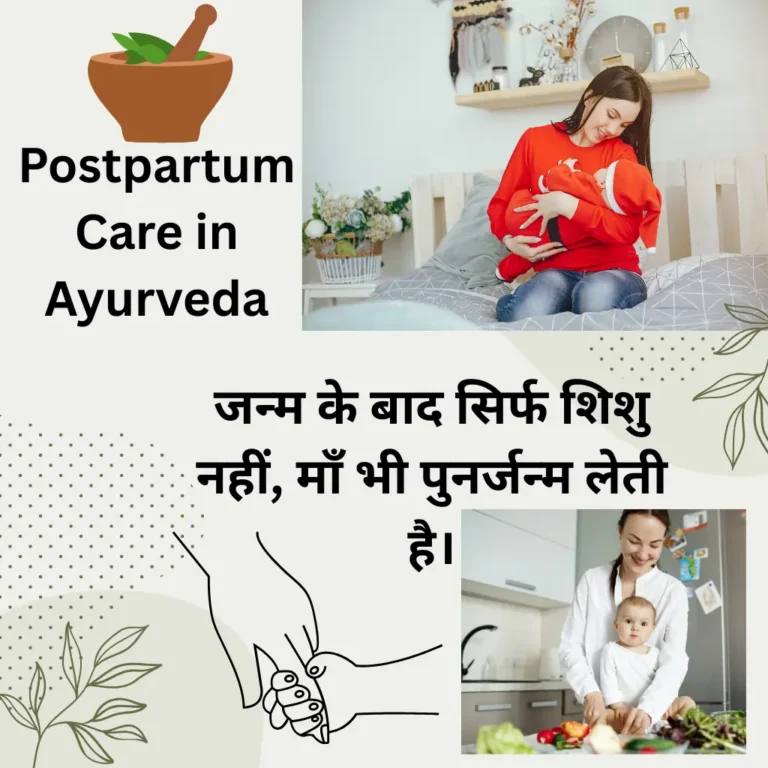Postpartum Care in Ayurveda – Ancient Healing for New Mothers
Introduction: What is Postpartum and Why Ayurvedic Care Matters
Becoming a mother is one of the most powerful moments in your life. But after childbirth, your body feels tired, your mind feels overwhelmed, and you may even feel confused about what’s happening to you. This special phase is called the postpartum period, and it’s a time when you need extra care, warmth, and support.In Ayurveda, the postpartum period is known as “Sutika Kala”, which means “the time of the new mother.” According to Ayurveda, the first 42 days after delivery are the most important for your long-term health. That’s why postpartum care in Ayurveda focuses on healing your body, calming your mind, and bringing back your strength naturally with herbs, massages, food, and rest.
Want to learn more about Ayurvedic healing? Read our blog on Panchakarma Detox – 7 Days to cleanse your body gently.
Let’s explore how Ayurveda becomes your gentle friend after childbirth.
What Are the Three Stages in Postpartum?
The postpartum journey happens in three main stages:
| Stage | Time Frame | What Happens |
|---|---|---|
| Immediate Stage | First 24 hours | Body begins healing after childbirth, bleeding starts |
| Subacute Stage | 2 to 6 weeks | Uterus shrinks, hormones shift, milk production begins |
| Delayed Stage | 6 weeks to 6 months | Full recovery, energy returns, periods may restart |
Ayurveda pays special attention to the first 40 days, which are often called the “Sacred Window.” This is when your body is most open to healing—and also most vulnerable. What you do now can shape your health for the next 40 years.
What are the Normal Symptoms of Postpartum?
After delivery, many changes happen in your body. Here are some common postpartum symptoms you may notice:
-
Bleeding (Lochia) – lasts for 2–6 weeks
-
Fatigue – due to blood and energy loss
-
Swelling or soreness in breasts
-
Constipation and gas
-
Abdominal cramps as uterus shrinks
-
Mood swings or baby blues
-
Hair fall
-
Backache or joint pain
These are normal and expected. But if you have extreme bleeding, feel very depressed, or have high fever, consult your doctor right away.
Ayurveda: Why is Postnatal Care Important?
In Ayurveda, Vata dosha becomes dominant after childbirth. Vata is dry, cold, and light. If Vata increases too much, it can cause:
-
Anxiety
-
Insomnia
-
Body aches
-
Poor digestion
-
Weak immunity
To bring Vata back to balance, Ayurvedic postpartum care focuses on:
-
Warm, nourishing food
-
Herbal medicines
-
Abhyanga (oil massage)
-
Good sleep
-
Emotional support
Postnatal care in Ayurveda isn’t just about recovery. It’s about rebuilding the mother’s strength from deep within, protecting her mental health, and ensuring a healthy future for both mom and baby.
Postpartum Recovery: The Ayurvedic Way
1. Ayurvedic Diet After Delivery
What you eat after birth is very important. Ayurveda says your digestion is weak now, so eat only warm, soft, and easy-to-digest meals.
Foods to Eat:
| Food | Benefits |
|---|---|
| Moong dal khichdi | Light, protein-rich, easy to digest |
| Ghee | Helps tissue healing and digestion |
| Ajwain (carom) water | Reduces gas and helps in digestion |
| Jeera, fenugreek seeds | Increase breast milk |
| Turmeric milk | Reduces inflammation and boosts immunity |
| Daliya (porridge) | Comforting and nourishing |
Foods to Avoid:
-
Cold or raw food (like salads, yogurt)
-
Spicy and fried food
-
Stale or leftover food
-
Caffeine and soda
Want to explore more healing foods? Don’t miss our blog on Best Foods for Summer to Stay Hydrated.
2. Abhyanga – Ayurvedic Oil Massage
Daily massage is one of the best Ayurvedic practices for new moms.
-
Use warm sesame oil, Bala Tailam, or Dhanwantharam Tailam
-
Massage gently from head to toe
-
Follow with a warm water bath
Benefits:
-
Calms Vata
-
Reduces body aches
-
Improves circulation
-
Supports sleep
-
Strengthens muscles and joints
3. Herbal Bath (Snana) for Healing
A herbal bath with Ayurvedic herbs helps keep your body clean and reduces pain.
You can boil herbs like Dashmool, Turmeric, Neem, or Tulsi, and use this water for bathing.
Benefits:
-
Prevents infection
-
Relaxes muscles
-
Reduces swelling
4. Ayurvedic Herbs for Healing & Lactation
Some Ayurvedic herbs work like natural medicine to support your recovery and milk flow.
| Herb | Use |
|---|---|
| Shatavari | Increases breast milk, balances hormones |
| Ashwagandha | Reduces stress and supports mental health |
| Bala | Strengthens muscles, relieves fatigue |
| Methi (fenugreek) | Enhances milk and digestion |
| Dashmool | Speeds up internal healing |
Always consult your Ayurvedic doctor before using herbs, especially if you are breastfeeding.
Ayurveda for the First 40 Days After Birth
In Ayurveda, this 40-day period is considered a golden healing time. The body is open to rebuilding, and care given now helps prevent issues like:
-
Back pain
-
Mood disorders
-
Hormonal imbalance
-
Fertility issues
Tips for the First 40 Days
Do:
-
Eat warm, home-cooked food
-
Take plenty of rest
-
Get daily massage
-
Stay warm (use socks, head wrap)
-
Drink herbal teas (like fennel or cumin water)
Don’t:
-
Skip meals
-
Expose yourself to cold or wind
-
Eat raw food or leftovers
-
Use screens late at night
-
Overexert your body
Learn more about healing from hormone changes in our post: Ayurvedic Solutions for Infertility
Ayurvedic Tips for Improving Sleep during the Postpartum Period
It’s common to feel exhausted and sleep-deprived during this phase. Ayurveda has gentle ways to help.
Sleep Support Tips:
-
Drink warm milk with nutmeg at night
-
Apply Brahmi oil on scalp before bed
-
Massage your feet with sesame oil
-
Do deep breathing (pranayama) before sleep
-
Avoid bright lights or screen time before bed
Getting enough sleep helps your mind stay calm and your body heal faster.
Key Takeaways
Here’s a quick summary of what you learned:
| Key Point | Why It Matters |
|---|---|
| 1. Postpartum care is important | Helps heal your body and balance emotions |
| 2. Ayurveda focuses on 42 days of healing | Prevents long-term health problems |
| 3. Warm food, herbs, and rest are essential | They balance Vata and support digestion and energy |
| 4. Abhyanga (oil massage) is highly healing | Reduces pain and promotes calm |
| 5. Sleep and mental care are just as important | Helps reduce anxiety and improve bonding with baby |
Conclusion
Being a new mom is not easy, but it can be beautiful when you’re cared for. With Ayurvedic postpartum care, you are treated like the queen you are—because you’ve done something magical.
Your body needs time, warmth, rest, and natural healing. This ancient system of care is not just for recovery—it’s for rebuilding your strength, your peace, and your joy.
You’ve given birth. Now give yourself the gift of healing.
Frequently Asked Questions About Postpartum Care
Shatavari is one of the best for healing and milk production. Ashwagandha and Bala are also helpful. You can start 3–5 days after a normal delivery. For C-section, wait 10–14 days and consult your doctor. Avoid cold food, late nights, spicy food, raw vegetables, and too much screen time. Ayurveda recommends 40 full days of rest and recovery, known as the Sacred Window. Yes! Proper care now helps prevent problems like back pain, low energy, and hormonal imbalances later in life.


